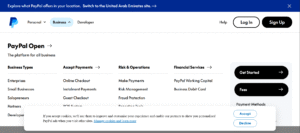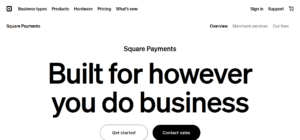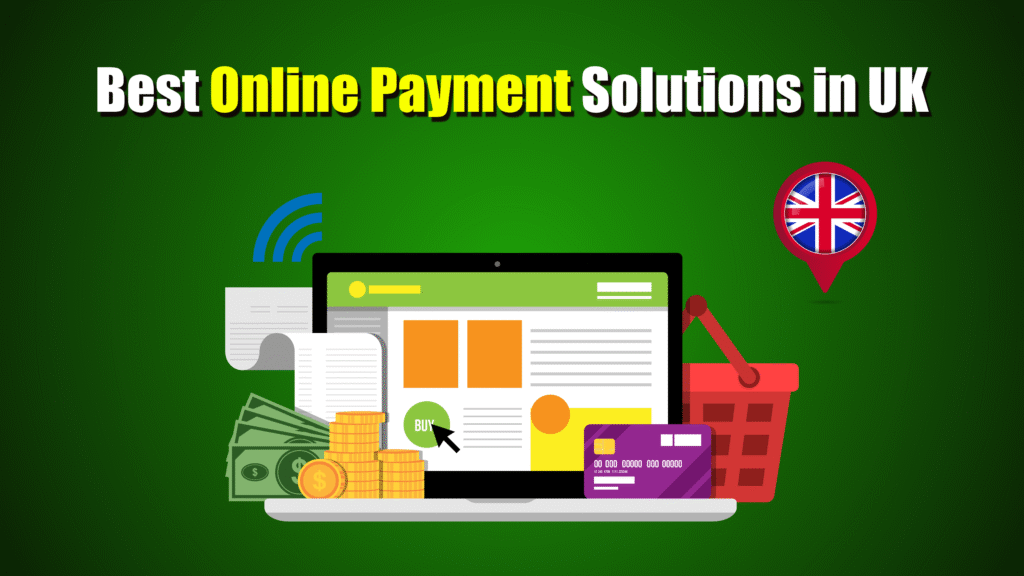Online payment solutions have become essential for businesses and freelancers across the UK in 2026. Whether you’re managing a retail store, an eCommerce platform, or a service-based business, these tools help streamline transactions, reduce checkout friction, and increase customer trust. As consumer preferences shift toward faster, contactless, and more secure payment methods, having the right system in place is no longer optional — it’s a competitive necessity.
Over 85% of UK businesses now use digital payment platforms to accept credit cards, bank transfers, and mobile wallets. Industry leaders such as Deliveroo, ASOS, and Monzo rely on cutting-edge payment software to deliver seamless payment experiences. Many of these platforms also integrate with accounting, invoicing, and POS systems, making it easier to manage finances from a single dashboard.
So, what separates a top-tier online payment system from the rest? The best options offer instant payouts, strong fraud protection, multi-currency support, and easy integration with eCommerce platforms. Whether you’re a startup, a mid-size firm, or a multinational retailer, there’s a solution tailored to your business model and payment volume.
In short, here are some of the most popular online payment software options in the UK for 2026:
- Stripe – Best for Customisable Online Payment Integration
- PayPal Business – Best for Quick Setup and Global Reach
- Square Payments – Best for In-Person and Mobile Payments
- Revolut Business – Best for Multi-Currency Payment Handling
- Worldpay from FIS – Best for Large Volume Retailers and Enterprises
Want a full ranked breakdown of the top 15 online payment platforms in the UK including which ones offer the best rates, integrations, and security features? Let’s get into it!
Top 15 Best Online Payment Solutions in UK
- Stripe – Best for Customisable Online Payment Integration
- PayPal Business – Best for Quick Setup and Global Reach
- Square Payments – Best for In-Person and Mobile Payments
- Revolut Business – Best for Multi-Currency Payment Handling
- Worldpay from FIS – Best for Large Volume Retailers and Enterprises
- Checkout.com – Best for Global Payments and Enterprise Solutions
- SumUp – Best for Small Businesses and Card Readers
- Opayo (formerly Sage Pay) – Best for UK-Based Businesses Needing Reliability
- Adyen – Best for Unified Commerce and Omnichannel Payments
- Zettle by PayPal – Best for Mobile POS and Quick Setup
- GoCardless – Best for Direct Debit and Subscription Billing
- Amazon Pay – Best for Seamless Checkout for Amazon Shoppers
- Klarna – Best for Buy Now, Pay Later (BNPL) Integration
- Wise Business (formerly TransferWise) – Best for International Transfers and FX Savings
- Trust Payments – Best for Regulated Sectors and High-Risk Industries
Before You Start…
Choosing the right online payment system can directly impact your conversion rates, cash flow, and customer satisfaction. Some tools are built for speed and mobility, while others focus on scalability, security, or global reach. The key is to choose a platform that not only meets your current needs but also scales with your growth.
“Online payments are no longer a luxury for UK businesses — they’re a foundation. Customers expect speed, security, and convenience every time they pay,” says Liam Walker, eCommerce Consultant at FinTech Insights UK.
Questions to Ask When Choosing an Online Payment Solution
- Does it support multi-currency payments and conversions?
- Are there integrations with your eCommerce, accounting, or POS platforms?
- What are the transaction fees, setup costs, and withdrawal limits?
- Is it FCA-regulated and compliant with UK financial laws?
- Does it offer fraud protection, chargeback support, and real-time reporting?
Each payment solution featured in this list has been evaluated based on these essential questions. Understanding the strengths and weaknesses of each platform will help you select the one best aligned with your business goals and payment preferences.
How This Top 15 List Was Created
To help you find the most trusted and effective online payment platforms in the UK, our editorial team reviewed over 40 solutions across key criteria including transaction speed, security, compliance, integrations, fees, and user experience. We tested tools for payment collection, recurring billing, invoicing, and currency exchange capabilities.
Feedback from UK-based businesses ranging from local shops to digital startups was also factored in to assess real-world reliability, customer service, and scalability. Whether you’re a freelancer needing fast payments or a high-volume eCommerce brand handling global transactions, this list includes the best solutions available in 2025.
Understanding Online Payment Pricing Models
Choosing the right payment solution means understanding both the fee structure and the value offered. Some services charge a flat transaction fee, while others use percentage-based models or tiered pricing depending on your sales volume or features needed.
Pricing Considerations for Small Businesses
Online payment platforms like Square, PayPal, and Stripe offer transparent and low-entry pricing, making them perfect for startups, creators, and small retailers. These services often include:
- No setup or monthly fees
- Simple, flat-rate transaction charges
- Instant payouts or next-day deposits
- Easy integration with websites and online stores
Pricing Considerations for Medium to Large Businesses
If you’re operating at scale or need more control over your cash flow, providers like Adyen, Worldpay, and Checkout.com offer enterprise-level features such as:
- Custom pricing models based on volume
- Multi-currency and cross-border payment support
- API access for developers
- Detailed analytics and risk management tools
Wondering which online payment solution can best serve your business in 2026?
Let’s explore the Top 15 Best Online Payment Solutions in the UK, reviewed in detail below.
#1 – Stripe – Best for Customisable Online Payment Integration
Stripe is a leading payment processor known for its highly customizable API and developer-friendly tools. Perfect for businesses that want to build a tailored checkout experience, Stripe supports a broad range of payment methods including cards, wallets, and bank debits. It is widely used by startups, SaaS companies, and eCommerce platforms looking to scale globally while maintaining control over their payment flows.
Review:
Stripe provides a robust platform with extensive developer resources, allowing seamless integration across websites and mobile apps. Its features include subscription billing, fraud prevention, and detailed reporting dashboards. While Stripe requires some technical know-how for setup, its flexibility and transparent pricing make it popular among tech-savvy businesses.
Features of Stripe:
- Powerful APIs for full customization
- Supports over 135 currencies and payment methods
- Advanced fraud detection and security tools
- Subscription and invoicing management
- Real-time reporting and analytics
Final Verdict:
Stripe excels as a highly flexible and scalable payment solution for businesses that want full control over their payment system. Its comprehensive toolkit suits companies from startups to large enterprises, especially those operating internationally.
Pros of Stripe:
- Developer-friendly with detailed documentation
- Supports many payment types and currencies
- Transparent and competitive fees
- Excellent fraud protection features
Cons of Stripe:
- Requires technical expertise for integration
- Customer support can be slow at times
- No built-in merchant account relies on Stripe as payment processor
#2 – PayPal Business – Best for Quick Setup and Global Reach
PayPal Business is one of the most widely recognized online payment platforms, favored for its ease of setup and trusted brand name. It allows businesses to accept payments from customers worldwide quickly, with options for invoicing, subscriptions, and pay-by-email.
Review:
PayPal’s business solution offers a user-friendly interface and fast onboarding process. It supports payments in multiple currencies and integrates with popular eCommerce platforms like Shopify and WooCommerce. Although fees are higher compared to some competitors, PayPal’s buyer and seller protections create confidence for both parties.
Features of PayPal Business:
- Instant payment acceptance with PayPal accounts and cards
- Multi-currency support with automatic conversions
- Built-in invoicing and recurring payments
- Integration with major shopping carts and marketplaces
- Fraud prevention and seller protection programs
Final Verdict:
PayPal Business is ideal for businesses seeking a quick, reliable payment setup with global customer reach. It’s perfect for freelancers, small retailers, and companies that want to leverage PayPal’s trusted name for buyer confidence.
Pros of PayPal Business:
- Very easy to get started
- Large customer base familiar with PayPal
- Secure payment processing and buyer protection
- Wide integration options with other software
Cons of PayPal Business:
- Higher transaction fees compared to some providers
- Account holds and freezes reported occasionally
- Limited customization of checkout flow
#3 – Square Payments – Best for In-Person and Mobile Payments
Square Payments combines online and offline payment acceptance, making it a versatile option for businesses with physical stores and mobile sales. Known for its intuitive hardware and software ecosystem, Square offers seamless processing for credit card, contactless, and mobile wallet transactions.
Review:
Square’s platform includes free POS software, inventory management, and customer relationship tools. Its plug-and-play card readers enable easy in-person sales, while the online payment gateway supports eCommerce integration. The transparent flat-rate pricing is attractive for small to medium businesses seeking simplicity.
Features of Square Payments:
- Free POS app and affordable card readers
- Supports contactless payments and chip cards
- Online payment gateway for website integration
- Inventory and customer management tools
- Instant deposits available
Final Verdict:
Square Payments is a great all-around choice for businesses needing a unified solution for in-person and online sales. Its ease of use and affordable hardware options make it especially suited for small retailers and mobile vendors.
Pros of Square Payments:
- Simple setup with free POS software
- Transparent flat-rate pricing
- Supports both in-person and online payments
- Robust ecosystem with additional business tools
Cons of Square Payments:
- Limited international availability outside select countries
- Advanced features require paid add-ons
- Not ideal for high-risk industries
#4 – Revolut Business – Best for Multi-Currency Payment Handling
Revolut Business offers a modern banking and payment platform tailored for companies dealing with international clients and multiple currencies. It provides real-time exchange rates, multi-currency accounts, and fast cross-border payments, making it an excellent choice for global trade.
Review:
Revolut Business supports payments in over 30 currencies, allowing businesses to hold, send, and receive funds without excessive foreign exchange fees. Its intuitive dashboard simplifies expense management, while integrations with accounting software help streamline bookkeeping. The platform also includes corporate cards and expense tracking features.
Features of Revolut Business:
- Multi-currency accounts with real exchange rates
- Instant global payments and transfers
- Virtual and physical corporate cards
- Integration with popular accounting tools
- Expense management and budgeting tools
Final Verdict:
Revolut Business is ideal for businesses operating internationally who want to reduce currency conversion costs and improve cash flow visibility. Its comprehensive financial tools go beyond payments to support broader business banking needs.
Pros of Revolut Business:
- Competitive FX rates and low fees
- Multi-currency flexibility
- Easy-to-use mobile and web apps
- Strong integrations with financial software
Cons of Revolut Business:
- Customer support can be inconsistent
- Some advanced features locked behind higher-tier plans
- Limited cash handling options
#5 – Worldpay from FIS – Best for Large Volume Retailers and Enterprises
Worldpay is a global payment processing giant catering primarily to large retailers and enterprise clients. It offers a comprehensive suite of payment acceptance options including card payments, eCommerce, and omnichannel solutions designed for high transaction volumes.
Review:
Worldpay’s platform supports multiple payment methods and currencies, combined with advanced fraud detection and data analytics. Its scalable infrastructure handles thousands of transactions per minute, making it reliable for businesses with heavy payment processing needs. The platform also integrates with numerous POS and ERP systems.
Features of Worldpay from FIS:
- Support for credit, debit, mobile, and eCommerce payments
- Omnichannel payment solutions for seamless customer experience
- Advanced fraud prevention tools
- Robust reporting and analytics dashboard
- Integration with enterprise resource planning (ERP) systems
Final Verdict:
Worldpay is a top choice for large businesses requiring a scalable, secure, and feature-rich payment platform. It excels in retail environments and enterprises that demand robust compliance and reporting capabilities.
Pros of Worldpay from FIS:
- Highly scalable for large transaction volumes
- Wide range of supported payment types
- Strong security and compliance features
- Flexible integration options
Cons of Worldpay from FIS:
- Pricing can be complex and varies by contract
- May be too feature-heavy for small businesses
- Setup and onboarding can be lengthy
#6 – Checkout.com – Best for Global Payments and Enterprise Solutions
Checkout.com is a global payment gateway focused on providing enterprises with flexible, developer-friendly payment solutions. It supports a broad range of payment methods and currencies, offering fast transaction processing and high uptime for mission-critical payment needs.
Review:
Checkout.com provides an extensive API platform enabling businesses to customize payment flows and access real-time data. It also offers fraud management, settlement optimization, and multi-currency acceptance. Companies benefit from dedicated account management and global compliance support.
Features of Checkout.com:
- Supports credit cards, wallets, and alternative payment methods
- Global multi-currency acceptance
- Real-time transaction analytics and reporting
- Advanced fraud detection and risk management
- Dedicated enterprise support and compliance assistance
Final Verdict:
Checkout.com is well-suited for enterprises and fast-growing businesses that require customizable payment infrastructure with global reach and regulatory compliance.
Pros of Checkout.com:
- Flexible and powerful APIs
- Strong focus on global payments and compliance
- Excellent uptime and reliability
- Responsive customer service
Cons of Checkout.com:
- Primarily targeted at medium to large businesses
- Pricing details not transparent on the website
- May require technical resources for integration
7. SumUp – Best for Small Businesses and Card Readers
SumUp is a popular payment solution designed especially for small businesses, sole traders, and mobile sellers. Its standout feature is easy-to-use, portable card readers that enable businesses to accept card payments anywhere — whether at markets, pop-ups, or customer sites. With no monthly fees and transparent transaction pricing, SumUp is an affordable choice for businesses just starting out or with low payment volumes.
Review:
SumUp offers a simple setup process with plug-and-play card readers compatible with smartphones and tablets. It supports major credit and debit cards, contactless payments, and even mobile wallets like Apple Pay and Google Pay. The SumUp app provides a user-friendly dashboard to track sales, issue receipts, and manage inventory. While it lacks some advanced features found in enterprise solutions, SumUp’s focus on affordability and mobility makes it ideal for microbusinesses and freelancers.
Features of SumUp:
- Portable card readers with no monthly rental fees
- Accepts chip, swipe, and contactless payments
- Mobile app with sales tracking and receipt management
- Transparent, pay-as-you-go pricing
- Compatible with major payment types and mobile wallets
Final Verdict:
SumUp is perfect for small, mobile businesses needing a reliable, low-cost way to accept payments on the go. It delivers excellent ease of use and flexibility without complicated contracts or monthly fees. For startups and sole traders, SumUp is an efficient, scalable option.
Pros of SumUp:
- No monthly fees or commitments
- Easy-to-use mobile card readers
- Transparent pay-per-transaction pricing
- Supports multiple payment types
- Great for mobile and pop-up businesses
Cons of SumUp:
- Limited advanced reporting and features
- Not ideal for large enterprises
- Payment settlement times may vary
- Lacks in-depth integrations with accounting software
8. Opayo (formerly Sage Pay) – Best for UK-Based Businesses Needing Reliability
Opayo is one of the UK’s most trusted online payment gateways, well known for reliability, security, and excellent local support. It is particularly suited to UK businesses requiring a secure and compliant payment solution with seamless integration into popular platforms such as Sage accounting and various eCommerce systems.
Review:
Opayo offers a secure and straightforward checkout experience for customers, supporting multiple payment methods including cards, Apple Pay, and PayPal. Its fraud prevention tools and PCI compliance features ensure businesses meet UK regulatory standards. The platform supports recurring payments and subscription models, making it a flexible choice for various business types. Opayo’s UK-based customer support is a strong point, providing peace of mind for local businesses.
Features of Opayo:
- Secure and PCI DSS compliant payment processing
- Supports cards, digital wallets, and recurring payments
- Easy integration with Sage accounting and eCommerce platforms
- Advanced fraud screening and chargeback management
- UK-based customer service and support
Final Verdict:
For UK businesses seeking a reliable, secure, and locally supported payment solution, Opayo stands out. Its strong compliance credentials and smooth integrations make it ideal for retailers, service providers, and subscription businesses wanting peace of mind and efficiency.
Pros of Opayo:
- Trusted UK payment gateway with strong security
- Supports recurring billing and subscriptions
- Integration with Sage and other UK accounting tools
- Robust fraud prevention features
- Excellent local customer support
Cons of Opayo:
- Pricing can be complex and may vary by business size
- Interface may feel dated compared to newer platforms
- Limited international payment options compared to global competitors
9. Adyen – Best for Unified Commerce and Omnichannel Payments
Adyen is a global payment platform tailored for businesses looking for a unified commerce solution that integrates online, in-store, and mobile payments into one system. It supports a vast range of payment methods and currencies, making it ideal for UK businesses with international reach or those scaling fast.
Review:
Adyen offers a highly scalable and customizable platform trusted by major brands like Spotify, Uber, and Microsoft. Its unified commerce approach allows businesses to manage payments across multiple channels with a single dashboard, improving customer experience and operational efficiency. Adyen’s advanced fraud detection, instant settlement options, and deep reporting features provide businesses with full control and transparency.
Features of Adyen:
- Unified payments across online, mobile, and POS channels
- Supports 250+ payment methods and 150+ currencies
- Advanced fraud protection and risk management tools
- Real-time data insights and reporting dashboard
- Flexible API for seamless integration with existing systems
Final Verdict:
Adyen is the go-to solution for businesses requiring a sophisticated, all-in-one payment platform that scales globally. Its flexibility, comprehensive payment coverage, and powerful analytics tools make it a top choice for enterprises and fast-growing companies.
Pros of Adyen:
- Extensive global payment and currency support
- Unified commerce for seamless customer experience
- Highly customizable and developer-friendly APIs
- Strong fraud prevention and security features
- Trusted by many large international brands
Cons of Adyen:
- Pricing may be high for small businesses
- Setup and customization can be complex
- Best suited for mid-to-large enterprises
10. Zettle by PayPal – Best for Mobile POS and Quick Setup
Zettle by PayPal is a popular choice for small to medium businesses needing a mobile point-of-sale (POS) solution with fast setup and reliable payment processing. Its integration with PayPal makes it convenient for businesses already using PayPal’s ecosystem.
Review:
Zettle offers easy-to-use card readers compatible with smartphones and tablets, enabling quick payment acceptance in-store or on the move. The platform supports contactless payments, chip & PIN, and mobile wallets like Apple Pay. Its seamless integration with PayPal allows quick fund transfers and consolidated financial management. Zettle’s simple pricing and no monthly fees appeal to businesses wanting transparent costs and straightforward operations.
Features of Zettle by PayPal:
- Portable card readers with fast setup
- Accepts contactless, chip & PIN, and mobile wallet payments
- Integration with PayPal accounts for easy fund management
- Inventory and sales tracking via the Zettle app
- Transparent, pay-as-you-go pricing
Final Verdict:
Zettle by PayPal is excellent for retailers and mobile vendors seeking a reliable, easy-to-use POS system that integrates with PayPal. It suits small businesses needing quick payment acceptance without complicated contracts or monthly costs.
Pros of Zettle by PayPal:
- Fast and simple card reader setup
- PayPal integration for seamless payments
- Supports multiple payment types
- No monthly fees, transparent pricing
- User-friendly mobile app
Cons of Zettle by PayPal:
- Limited advanced reporting features
- Not ideal for large enterprises
- Funds may take time to settle in some cases
11. GoCardless – Best for Direct Debit and Subscription Billing
GoCardless specializes in direct debit payments, making it an ideal solution for businesses with recurring billing, subscription services, or invoice collection needs. It simplifies bank-to-bank payments, reducing transaction fees compared to card payments.
Review:
GoCardless offers a streamlined way to collect recurring payments directly from customers’ bank accounts across the UK and internationally. The platform integrates easily with popular accounting, invoicing, and CRM systems, automating payment collection and reconciliation. Its transparent pricing and focus on reducing failed payments make it a smart choice for subscription businesses, utilities, and service providers.
Features of GoCardless:
- Direct debit payment processing with high success rates
- Integrations with accounting and invoicing software
- Automated payment collection and reconciliation
- Transparent, low-cost pricing
- Support for UK and international bank payments
Final Verdict:
For UK businesses relying on recurring billing or subscriptions, GoCardless is a cost-effective and reliable payment solution. It reduces administrative burden and improves cash flow with automated direct debit collections.
Pros of GoCardless:
- Lower fees than card payment processors
- Strong integrations with business software
- Automates recurring payments efficiently
- Transparent pricing with no hidden fees
- Supports multiple countries
Cons of GoCardless:
- Not suitable for one-time payments or card transactions
- Limited support for in-person payments
- Requires bank account details from customers
12. Amazon Pay – Best for Seamless Checkout for Amazon Shoppers
Amazon Pay allows businesses to offer a fast and familiar checkout experience by enabling customers to pay using their Amazon accounts. This convenience helps increase conversion rates and reduces checkout friction on eCommerce sites.
Review:
Amazon Pay integrates smoothly into online stores, allowing customers to use saved payment and shipping information from their Amazon profiles. It supports multiple payment types and ensures secure transactions backed by Amazon’s fraud protection. The platform offers seller protection policies and detailed transaction reporting. It’s particularly beneficial for businesses targeting customers who regularly shop on Amazon.
Features of Amazon Pay:
- Uses customers’ existing Amazon accounts for quick checkout
- Supports credit/debit cards and bank transfers via Amazon
- Fraud detection and seller protection programs
- Easy integration with popular eCommerce platforms
- Detailed transaction reporting and analytics
Final Verdict:
Amazon Pay is a strong choice for online retailers looking to boost conversions by leveraging Amazon’s trusted payment ecosystem. It offers a smooth and secure checkout experience that customers recognize and trust.
Pros of Amazon Pay:
- Familiar and fast checkout for Amazon users
- Strong fraud prevention and security
- Easy integration with major eCommerce platforms
- Seller protection and dispute resolution
- Trusted brand recognition
Cons of Amazon Pay:
- Limited to online payments only
- Less popular outside Amazon’s customer base
- Fee structure may be higher than some competitors
13. Klarna – Best for Buy Now, Pay Later (BNPL) Integration
Klarna is a leading payment solution that offers Buy Now, Pay Later options, enabling customers to split purchases into manageable payments without interest. This approach helps businesses increase sales by offering flexible financing at checkout.
Review:
Klarna’s seamless integration with eCommerce stores provides customers with several payment options, including pay later, pay in installments, or pay now. Merchants benefit from immediate payment upfront, while Klarna assumes the credit risk. The platform also includes marketing tools to promote BNPL offers, boosting conversion rates and average order values.
Features of Klarna:
- Multiple payment options: pay now, pay later, installments
- Seamless eCommerce integration with popular platforms
- Immediate merchant payment, Klarna covers customer risk
- Marketing tools for BNPL promotion
- Mobile-friendly checkout experience
Final Verdict:
Klarna is ideal for online retailers wanting to offer flexible payment solutions that attract more buyers and increase order sizes. It’s especially popular with younger consumers who prefer spreading payments.
Pros of Klarna:
- Boosts sales with flexible payment options
- Immediate payment to merchants
- Easy integration with major platforms
- Attractive to millennial and Gen Z shoppers
- Smooth user experience
Cons of Klarna:
- BNPL fees may be higher than traditional payment processing
- Limited availability outside select regions
- Requires merchant to trust Klarna’s underwriting
14. Wise Business (formerly TransferWise) – Best for International Transfers and FX Savings
Wise Business specializes in low-cost international payments and currency exchange, making it perfect for businesses dealing with multiple currencies or global suppliers and clients.
Review:
Wise offers transparent, real exchange rates without hidden fees, allowing businesses to send, receive, and hold funds in multiple currencies. Its multi-currency account lets companies pay invoices worldwide with minimal cost and speedier transfers compared to traditional banks. Integration with accounting software further simplifies bookkeeping.
Features of Wise Business:
- Real exchange rates with low transparent fees
- Multi-currency accounts and local bank details
- Fast international money transfers
- Integrations with popular accounting platforms
- Debit cards available for business expenses
Final Verdict:
Wise Business is a smart choice for UK businesses with international payment needs, helping save on currency conversions and transfer fees while maintaining transparency and ease of use.
Pros of Wise Business:
- Low-cost, transparent international transfers
- Holds and manages multiple currencies
- Easy integration with accounting tools
- Fast payment delivery
- Business debit card available
Cons of Wise Business:
- Limited credit or lending features
- Not suitable for in-person payments
- Some currencies may have transfer restrictions
15. Trust Payments – Best for Regulated Sectors and High-Risk Industries
Trust Payments specializes in secure payment processing for regulated sectors such as gambling, adult entertainment, and other high-risk industries. Their compliance focus makes them a trusted partner for businesses with complex regulatory requirements.
Review:
Trust Payments offers tailored payment solutions that prioritize security, compliance, and fraud prevention. Their platform supports a wide range of payment methods and currencies, backed by advanced risk management tools. They also provide detailed reporting to meet stringent regulatory audits and help businesses maintain operational integrity.
Features of Trust Payments:
- Specialized payment processing for high-risk industries
- Advanced fraud detection and compliance tools
- Multi-currency and global payment support
- Detailed reporting for regulatory audits
- 24/7 customer support with industry expertise
Final Verdict:
For businesses operating in regulated or high-risk sectors, Trust Payments delivers robust, compliant payment solutions that safeguard operations while facilitating smooth transactions.
Pros of Trust Payments:
- Expertise in high-risk and regulated industries
- Strong compliance and fraud prevention
- Supports multiple currencies and payment types
- Comprehensive reporting and audit support
- Dedicated industry-focused customer service
Cons of Trust Payments:
- Pricing may be higher than standard processors
- Not ideal for low-risk, everyday retail businesses
- Setup can be more complex due to compliance needs
Frequently Asked Questions(FAQs)
What is the best online payment solution for small businesses in the UK?
For small businesses, solutions like Stripe, PayPal Business, and SumUp offer affordable, easy-to-use platforms with quick setup. These tools support multiple payment methods and integrate smoothly with eCommerce and POS systems, making them ideal for startups and growing companies.
How do online payment solutions handle security and fraud prevention?
Most top payment providers employ advanced encryption, tokenization, and real-time fraud monitoring to protect transactions. They also comply with industry standards such as PCI DSS to ensure customer data is secure and minimize the risk of fraud.
Can I accept payments in multiple currencies with these platforms?
Yes, many solutions like Revolut Business, Wise Business, and Adyen support multi-currency payments, allowing your business to easily transact globally. They often provide competitive exchange rates and allow you to hold funds in different currencies.
Are there any fees for using Buy Now, Pay Later services like Klarna?
Buy Now, Pay Later providers usually charge merchants a fee per transaction or a percentage of the sale. These fees can be higher than standard payment processing costs, but the flexible payment options often lead to increased sales and higher average order values.
Which payment solution is best for businesses in regulated or high-risk industries?
Trust Payments is tailored for regulated sectors and high-risk industries, offering robust compliance and fraud prevention tools. Their specialized expertise helps businesses navigate complex regulations while ensuring smooth, secure payment processing.
